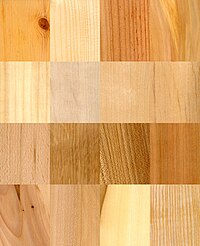
Photo from wikipedia
In this study, the aim was to optimize the cross-sectional geometry of auxetic dowels for furniture joints. For this purpose, two different sizes of auxetic dowels were chosen, one for… Click to show full abstract
In this study, the aim was to optimize the cross-sectional geometry of auxetic dowels for furniture joints. For this purpose, two different sizes of auxetic dowels were chosen, one for frame- and the other for panel-type furniture joints for designing the cross-sectional geometry. Auxetic patterns that are created on the cross-sectional area cause deficiency of the materials, and this phenomenon decreases the modulus of elasticity (MOE) and increases the member stress. Accordingly, maximum MOE values and minimum Poisson’s ratio levels were determined for the optimum strength-auxetic behavior relation by means of a Monte Carlo method. Furthermore, Poisson’s ratio of the optimized dowel’s cross-section was confirmed with experimental tests, numerical analyses and analytical calculations. As a result, Poisson’s ratio values were obtained as negative values and confirmed, which means the dowels designed in this study had auxetic behavior. In conclusion, it could be said that studies should be conducted on the performance of auxetic dowels in both frame and panel furniture joints.
Journal Title: Materials
Year Published: 2023
Link to full text (if available)
Share on Social Media: Sign Up to like & get
recommendations!